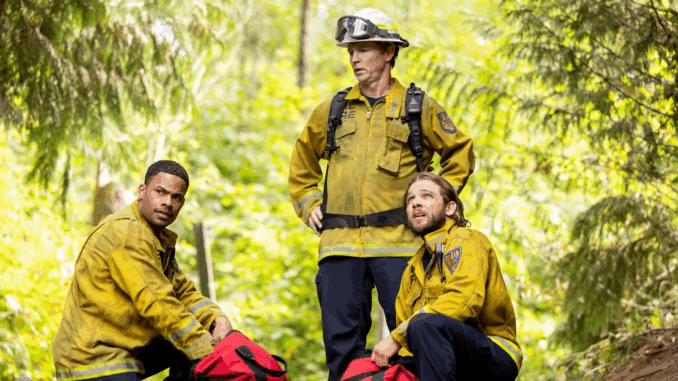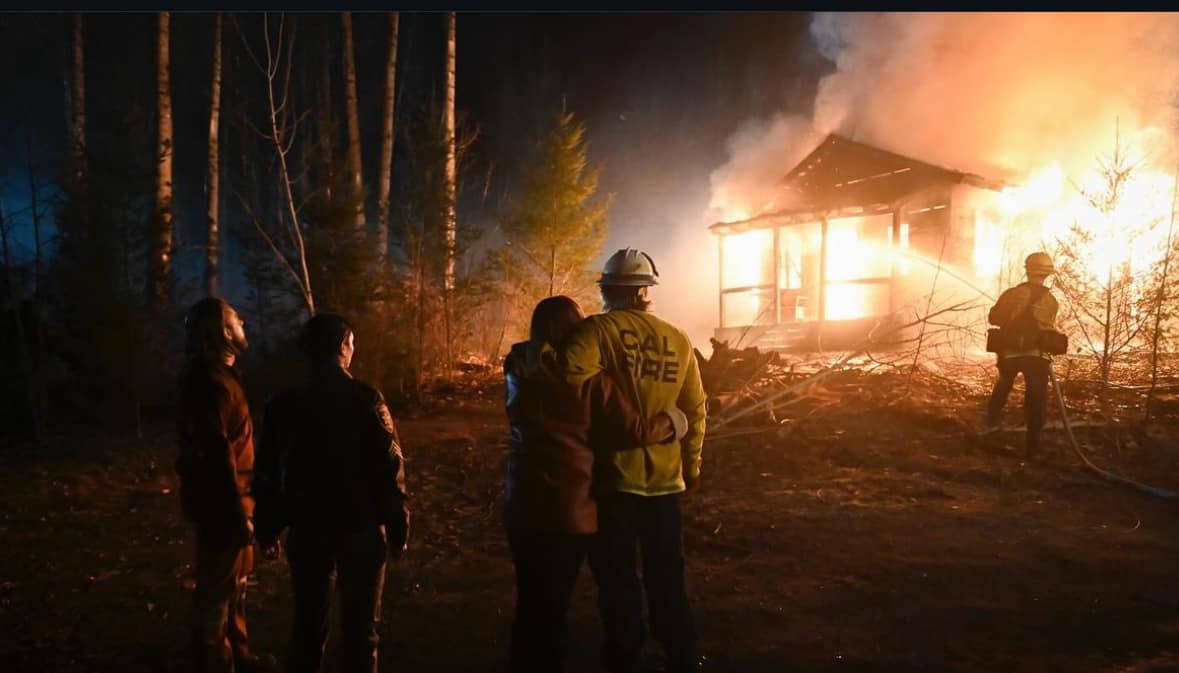
When the CBS drama Fire Country first premiered, audiences were instantly drawn to its raw emotion, high-stakes rescues, and deeply human stories. But beneath the smoke and action lies something much more personal — a story built from real experiences, real people, and the unrelenting courage of those who face California’s wildfires every year.
At its heart, Fire Country is more than a show about fighting flames. It’s about redemption, second chances, and the extraordinary resilience of a community that lives on the edge of disaster. Its inspiration, however, was born not in a Hollywood studio, but in the small Northern California towns that have long battled nature’s fury.
A Childhood in Fire Country
For actor and series co-creator Max Thieriot, the story of Fire Country is deeply personal. Growing up in Occidental, a rural community in Sonoma County, Thieriot witnessed firsthand the devastating power of wildfires. The 2017 firestorm that swept through Northern California left entire neighborhoods in ashes, destroying homes, farms, and memories. It was a moment that changed everything.
Thieriot remembers the chaos vividly — families evacuating, livestock being moved to safety, neighbors helping one another as the sky turned an apocalyptic orange. It wasn’t just tragedy; it was transformation. The experience left a permanent mark on him, sparking the idea that would eventually grow into Fire Country.
In the series, that sense of place — the tight-knit community, the smell of smoke in the air, the ever-present threat of fire — is palpable. Thieriot didn’t just want to tell a story about firefighters; he wanted to tell a story about home, loss, and the people who stay behind to protect what matters most.
Beyond the Flames: The Inmate Firefighters
What makes Fire Country stand out from other firefighting dramas is its focus on a little-known but very real program: California’s inmate firefighter crews. These programs, officially known as Conservation Camps, give incarcerated individuals the opportunity to train and work alongside professional firefighters to combat wildfires across the state.
It’s dangerous, grueling work — clearing brush, cutting containment lines, and facing unpredictable conditions. The pay is minimal, but for many inmates, it’s a chance at redemption, purpose, and contribution. The idea of someone rebuilding their life while literally fighting to save others became the emotional core of the series.
In Fire Country, Thieriot’s character, Bode Donovan, is a convicted felon who joins a prison fire camp in hopes of earning his freedom and making peace with his past. The show explores the tension between punishment and forgiveness, questioning what it really means to deserve a second chance.
This focus on redemption mirrors the real-world stories of men and women who risk their lives on the fire lines while trying to rebuild their futures. By bringing their reality into mainstream television, Fire Country sheds light on a system that often goes unnoticed — one filled with bravery, controversy, and humanity.

Fiction Meets Reality
While Fire Country dramatizes events for television, its authenticity runs deep. Thieriot worked closely with firefighters, camp supervisors, and local residents to capture the truth of life on the line. From the gear and fire tactics to the emotional toll of the job, the show’s creators sought to honor the people who inspired it.
The production also consulted individuals familiar with inmate fire crews to accurately portray the dynamic between incarcerated firefighters and professional CAL FIRE teams. The result is a series that feels grounded and raw — a blend of cinematic storytelling and real human experience.
Still, the show doesn’t shy away from the difficult questions surrounding the program: the low wages, the physical dangers, and the moral complexity of using inmate labor in life-threatening work. By weaving these issues into its narrative, Fire Country pushes viewers to think beyond the spectacle of fire and confront the realities behind it.
A Story of Redemption and Community
At its emotional core, Fire Country is not just about fires — it’s about people. Every blaze becomes a metaphor for the internal battles its characters face: guilt, shame, forgiveness, and the need for belonging.
Bode Donovan’s journey reflects the series’ central message — that redemption is possible, even in the ashes of past mistakes. Through his work in the fire camp, he finds not only self-respect but also the power of community. In that way, Fire Country becomes a love letter to second chances and to the human spirit’s ability to rebuild after destruction.
The series also pays tribute to the real firefighters and volunteers who put their lives on the line year after year. Their courage, exhaustion, and resilience are woven into every frame. The show’s portrayal of small-town life — where everyone knows everyone, and every fire feels personal — resonates deeply with those who’ve lived through such disasters.
Why the Real-Life Inspiration Matters
Understanding the real-world roots of Fire Country changes how audiences experience it. Knowing that its creator lived through the very fires depicted on screen adds emotional weight to every scene. The danger feels more immediate, the stakes more personal.
The inmate firefighter angle, meanwhile, shines a light on an often-overlooked side of California’s firefighting system. It sparks necessary conversations about justice, rehabilitation, and the value of human life — even those deemed expendable by society.
More importantly, it reminds us that behind every act of heroism is a story of struggle. Whether it’s a firefighter facing exhaustion, a prisoner seeking redemption, or a community rebuilding from ashes, Fire Country captures the shared humanity that burns beneath it all.
The Fire That Continues to Burn
Ultimately, Fire Country is a story born from real heat, real heartbreak, and real hope. It’s a tribute to the resilience of communities that refuse to give up — to the men and women who rush toward the flames while others flee, and to those who fight not only wildfires but also their own inner battles.
For Max Thieriot, Fire Country is more than a television project — it’s a personal mission. It’s a way to honor his hometown, his neighbors, and the spirit of people who know what it means to start over after losing everything.
The flames may be fictional, but the inspiration is not. Behind every episode lies a truth forged in fire: that even in destruction, there’s the possibility of rebirth — and in the ashes, the spark of redemption.
